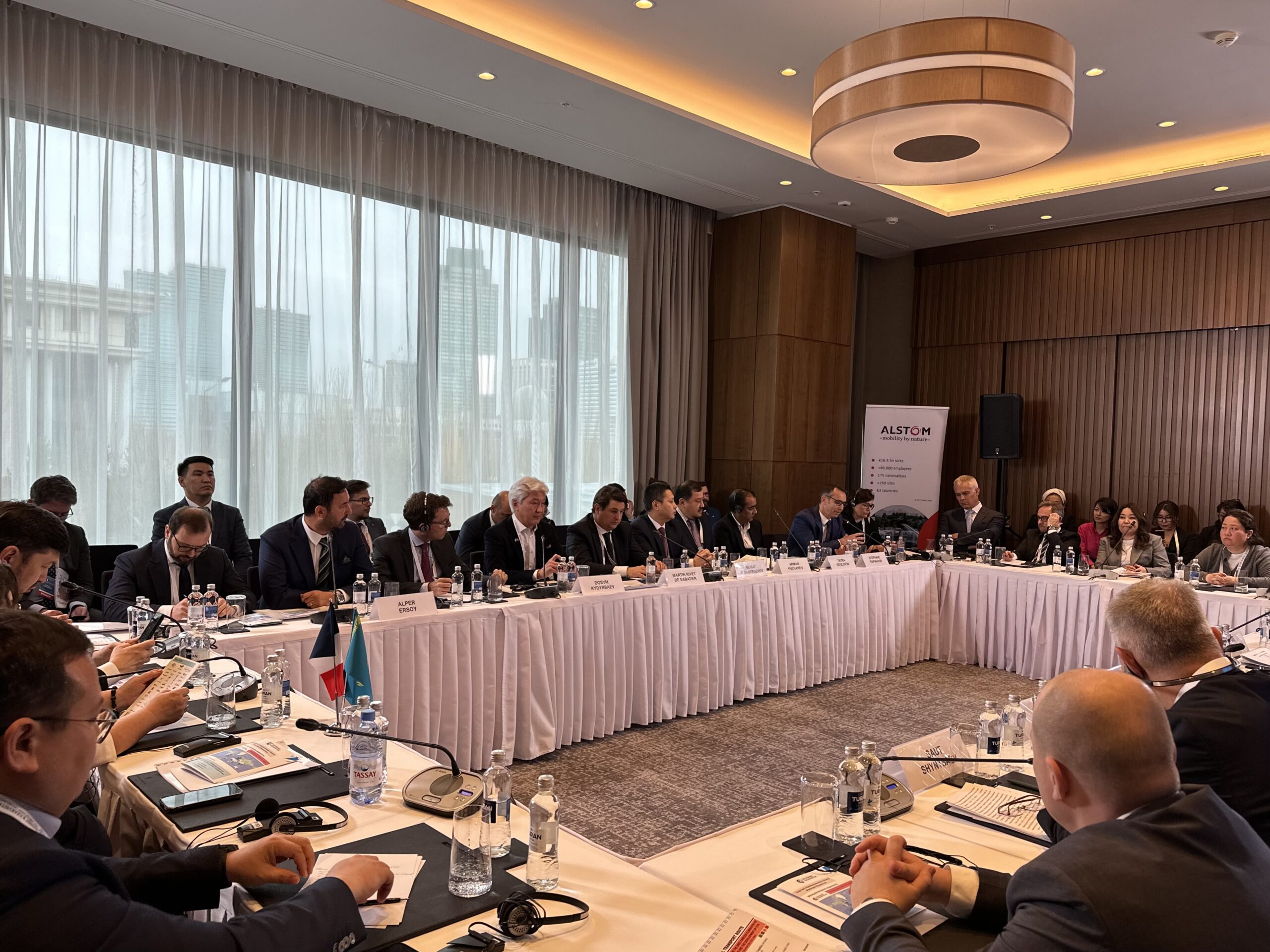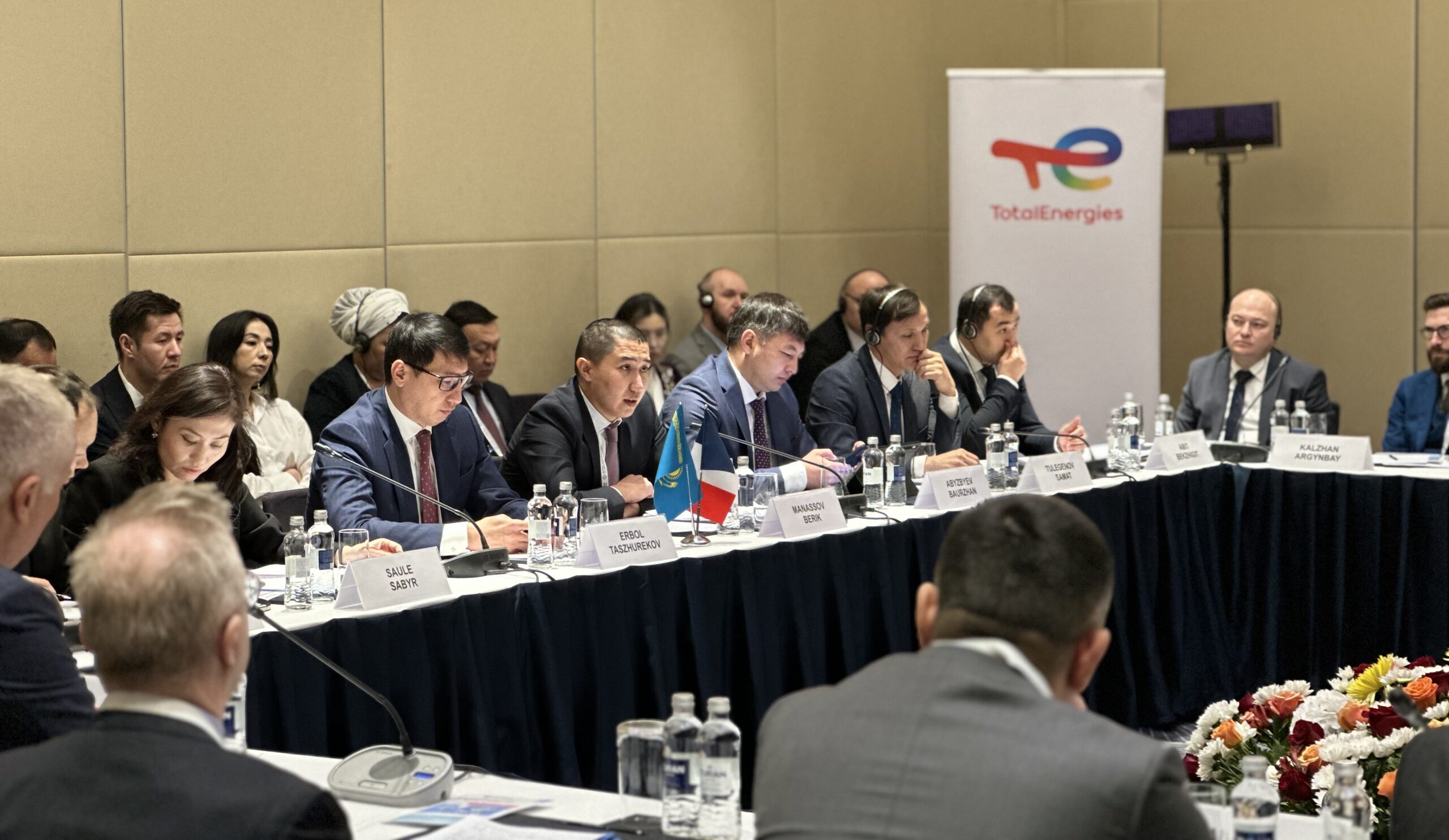ASTANA – Kazakhstan and France signed thirteen agreements in transport and logistics, engineering, health care, and agroindustry worth more than $1.4 billion as part of the Kazakhstan-France Business Forum with participation of the heads of states in Astana on Nov. 1.

French companies expressed readiness to support infrastructure development within transportation routes. Photo credit: The Astana Times.
The event, which was organized by Kazakhstan’s Foreign Ministry and Kazakh Invest national company, gathered more than 400 delegates – representatives of business circles and government officials from both countries. Four industry roundtables reviewed collaborative projects and outlined new prospects in economic cooperation.
Transport and logistics
Opening the transport and logistics roundtable, Dosym Kydyrbayev, the member of the Kazakhstan-France Chamber of Commerce and Industry, noted that “the official visit of French President Emmanuel Macron to Astana confirms the fact that Kazakhstan remains a strategic partner for France, and our investment partnership continues to grow.”

French speakers noted that Kazakhstan has the potential to contribute to achieving energy and food security both in the region and in Europe. Photo credit: The Astana Times.
In the given geopolitical landscape, the Trans-Caspian International Transport Route (TITR) or the so-called Middle Corridor, has gained special relevance as an alternative supply chain. It is a priority for both Kazakhstan and European countries. The route starts from China, runs through Kazakhstan, the Caspian Sea, Azerbaijan, Georgia and reaches Europe.
“The capacity of the Middle Corridor is nearly 6 million tons. Last year, Kazakhstan doubled the volume of cargo transportation, including the increase of container transportation by 34%. In the past nine months this year, the volume has increased by 88% and amounted to 2 million tons,” said Transport Committee Chairman at the Kazakh Transport Ministry Altai Ali.
The delivery time of goods through the corridor has been shortened from 53 days to 33 days. “We plan to reduce the waiting time to 18 days,” he noted.
Kazakhstan’s strategic goal, Ali emphasized, is to “increase the Middle Corridor’s capacity to 10 million tons by 2030.”
Airbus Helicopters, the French helicopter manufacturer, is a partner of FlyArystan, Kazakhstan’s first low-cost airline, and the Air Astana national air carrier. It offers services in aeronautical engineering, including cargo aircraft, space activities, telecommunications, data, and analytics. Its vice president for Eastern Europe, Türkiye, and Central Asia Europe Thomas Zeman said that “for many years, the company remains Kazakhstan’s significant investor and the Kazakh government’s partner.”
Three years ago, the sale of shares of the Almaty International Airport for $415 million was hotly debated among Kazakh citizens. It is now owned by TAV, a Turkish airport operation and services firm, which is part of Groupe Aeroports de Paris (ADP). Groupe ADP owns and manages Parisian international airports Charles de Gaulle Airport, Orly Airport, and Le Bourget Airport.
“Almaty International Airport has a perfect location – between East and West. It is also an attraction point for transit travelers. We invested more than $200 million in the ongoing construction. Hopefully we will finish it in June,” said TAV President Alp Er Tunga Ersoy. He noted that the company is now focused on upgrading the systems and the facilities, as well as on simplifying the customer procedures, especially on the transit cargo.
Almaty International Airport is the first airport in TAV’s portfolio where the company owns the airport instead of a time limited concession.
As part of the forum, Alstom, the French multinational rolling stock manufacturer, and the Kazakh government signed an investment agreement worth more than $100 million for the production and maintenance of railway locomotives, rolling stock, and its components in Kazakhstan.
Agro-food complex
France has a strong presence in agricultural genetics with a long list of contributions to the field and ongoing research activities. French companies expressed their interest in cooperating with agricultural enterprises in Kazakhstan, particularly to ensure food security in the region.

France’s investments in Kazakhstan’s economy are primarily concentrated in the energy and mining sectors. Photo credit: The Astana Times.
In his opening remarks, Vice Minister of Agriculture in Kazakhstan Yerbol Taszhurekov highlighted the significant potential for strengthening relations in livestock genetics, greenhouse farming, plant and poultry production, and vaccine manufacturing for animals.
Director-General of Asyl Tulik Bolat Seisenov reiterated the company’s willingness to continue cooperation with Synetics, a leading genetic company in Europe. Asyl Tulik, the national center for breeding in animal husbandry, is the largest one in Central Asia.
“Kazakhstan has poor forage pastures. Our animals have to cover long distances of 20-30 km a day to gain weight. We look forward to applying best French practices and technologies in genetics, but carefully, so as not to lose the regional breed given specific climatic features,” noted Seisenov.
Cyrill Josse, the business development manager at Synetics, said there are “three projects on the agenda to consider in November with Kazakh partners.” The most important one, according to him, aims to develop species with muscular endurance, cleanliness, and fertility.
“Our trade turnover with Kazakhstan is growing. We believe our company contributes not only to the development of the countries’ agriculture, but to alternative sectors, and localization of products,” said SNA Vice President Paul Grignon-Dumoulin. With a focus on genetics of bird species, SNA delivers production to 33 countries.
Engineering
Total Energies, a French multinational integrated oil and gas company, Kazakhstan’s Samruk Kazyna Sovereign Wealth Fund, and the KazMunayGas national oil company established the Aktas Energy, a joint venture in the Zhambyl region to construct a 1-gigawatt wind power plant.
“This is the major step in developing renewable energy sources in Kazakhstan. We are happy to have such a reliable partner. Congratulations to all of us. Kazakhstan is a young country with a fast-growing population and increasing energy consumption, and we understand that we have to build new capacities,” said Saltanat Satzhan, the Samruk Kazyna managing director for development and privatization.
Samruk Kazyna manages assets of $78 billion. Its portfolio includes national strategic companies, such as KazMunaiGas (KMG), Kazatomprom, Air Astana, Kazakhstan Temir Joly, and Samruk Energy.
Air Liquide, a French multinational company, supplies industrial gasses worldwide. In 2018, together with KMG it established a joint venture in Kazakhstan – Air Liquide Munay Tech Gases (ALMTG). ALMTG has been supplying hydrogen and nitrogen to KMG’s refinery in Pavlodar.
“In the long term, we will continue to be focused on growth and investment in Kazakhstan. It should be noted that further actions should go hand-in-hand with the decarbonization agenda,” said ALMTG Commercial and Energy Transition Director Anastasia Budayeva.
Samruk Kazyna also signed a memorandum in corporate financing with Societe Generale, a French-based multinational financial services company.
Health care
Heads of hospitals, medical scholars, insurance providers and representatives of pharmaceutical companies from Kazakhstan and France addressed the growing demand for advanced equipment and medication, their production and allocation.
Within developing the biotech cluster, the Boehringer Ingelheim French company and the QazBioPharm national pharmaceutical holding agreed to produce a vaccine against anthrax. It will contribute to improving the epidemiological situation and granting Kazakhstan the status of an anthrax-free country, as well as increase exports of Kazakh meat products to external markets.
French authorities and companies in the healthcare and pharmaceutical sectors show great interest in implementing investment projects in Kazakhstan.
France’s C3Medical company, which offers international consulting services to state structures and healthcare facilities in medical care, will collaborate with Kazakhstan in the areas of detecting oncological diseases and knowledge transfer. The company will also implement a pilot project to introduce a modern digital visualization system in selected clinics in Astana.
In his official statement during the business forum, Kazakh President Kassym-Jomart Tokayev mentioned the importance of developing biotechnology and medicine within bilateral cooperation.

